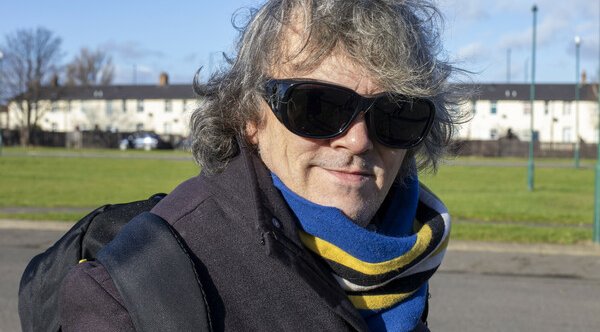How Living Well With Sight Loss Courses can help put things in perspective

Eddie Hartop is 52 years old and has Schnyder corneal dystrophy. Eddie did RNIB’s Living Well With Sight Loss course (LWWSL) in 2021. He is married with three kids. Eddie is studying Classics at the Open University.
“I’ve known about RNIB since I was young, as my mother has the same sight condition. I have Schnyder corneal dystrophy - a hereditary eye condition that I developed in my 30s. It’s quite a gradual condition, where you get crystals growing in the eyes. I got involved with RNIB when my eyesight started to really deteriorate, I just wanted somebody to help me out because I didn’t know where to turn.
I can see closeup reasonably well, but reading text is difficult for me, I have to use certain lights and I’m also photophobic. I tend to keep my curtains closed when I’m indoors, and try not to use fluorescent lighting. When I’m out, I can’t see the signs on things and people’s faces aren’t very clear anymore. I still have some clear vision in my right eye. I can read a book, but only for about a minute or two before my eyes start to hurt.
Sharing experiences with the Living Well With Sight Loss course
The LWWSL course made me feel less isolated. People talk about their own experience of sight loss, so you get a good idea of how others are trying to cope, which I found very helpful. There’s a lot of people in the group who are older than me and they struggle with things like technology - I think it’s very important that everybody with sight loss or blindness has access to technology. I’m very au fait with technology, and I managed to help a few people by discussing things with them.
Reframing things with the Focus on Wellbeing course
Most of all, the Focus on Wellbeing course helped me to be more positive. It’s good to be realistic about things, realising that everything’s not going to magically get better overnight - but eventually things will get easier, as you take that one small step at a time. You have to reframe the situation, change the simple things; like knowing where the knives and forks are in a drawer, putting things away in a certain area so you know where they are, so you can have instant access. Just doing little things to help life run more smoothly.
Building confidence with everyday things
A particular issue I had was that I just started cane training and was very worried about going out with my long white stick, thinking about how people would judge me and react to it. Even now I’ve been using the cane for a couple of months, I still feel a bit uncomfortable using it and asking for help - but pride comes before a fall, and I’m slowly adapting. It helped me to realise that I shouldn’t be too worried about accepting help - it’s nice to know that you don’t have to be alone in this journey.
I’m not bothered about using a cane so much now. But it’s the discrimination you sometimes come across with people who are ignorant. I’ve had people call out, “You’re not blind,” and I shout to them, “No, I’m not blind, I’m partially sighted, thank you very much.” Although it does upset me, now I just brush it off. You get people like that in society, but you’ve just got to rise above it.
Future plans
I’m looking to help RNIB by doing voluntary work. Ultimately, I want to do some mentoring or something like that within a group - perhaps some technology teaching. I’ve got a mentoring and a teaching certificate, so I’m pretty well qualified.
Building a community with LWWSL
I think it’s always going to be a struggle, but we need courses like the LWWSL to help people out. Everybody’s at a different level in life - some people have been blind from birth, for others sight loss has come on suddenly, and for people like myself it’s a gradual thing.
You know there’s not a lot they can do about it and it’s just life, learning to deal with that loss and giving the person the confidence they need to move forward. With the LWWSL course that person might pick up a little tip, and it’s keeping them within the RNIB community. Because that’s what RNIB is, a community of people helping each other out, who wouldn’t necessarily get that help from others.”
Don’t be afraid to ask for help
The first thing I would say is contact RNIB, don’t be scared - just take that one step, have a chat with somebody - you’ve got to know that there’s somebody to help you. If it wasn’t for RNIB, I wouldn’t have got the help and courage to get help I needed."





